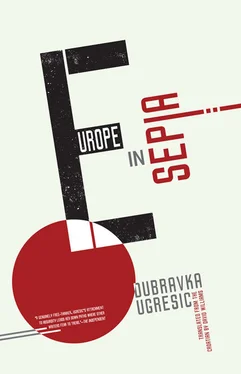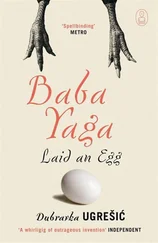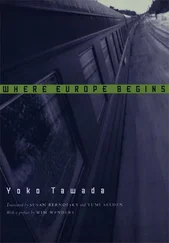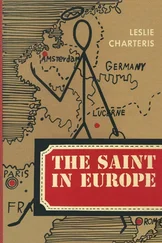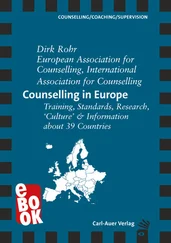LATELY I’VE CAUGHTmyself turning the faces and hues of Central Europe into photographs, an automatic click on an internal camera and I’m done. A second later an iPhoto program whirrs inside me: import — effects — sepia — done. It’s as if the surrounding reality is a screen, stuck to my hand an invisible remote with three options: past, present, future. But only one of them works: past, sepia .
Maybe a recent sleepless night in Bratislava triggered the reflex. The hotel room had an unusual “dummy” window, facing not outward to the exterior, but inward, to the reception desk. I kept the window closed and the curtains drawn, both of which appeared to increase the density of the claustrophobia in the air. Having given up trying to fall asleep, it was probably around two in the morning when I opened the new edition of The Economist and stared long at a map of Europe divided into three-color zones. An alarming red color marked countries in recession, yellow the countries somehow muddling through, and green the absence of recession. Slovakia, Estonia, and Slovenia were alone in the green zone; news reports the next day announced that Slovenia had just slipped into yellow. In the hope it might send me to sleep, I browsed a tourist brochure I’d picked up at the reception. On a map of Slovakia, a settlement bearing my name northwest of Bratislava caught my eye. Rather than surprise or delight ( look, the little spot and I have the same name! ), in a flash of recognition I was overcome by the fact that ours was a kinship based on inconsequence and insignificance. Ah, that Slavic linguistic sisterhood, dub — dubrava , all those forests and woods, leaves and oaks, hills and valleys, water and wetlands, in Slovak all so painfully similar to my native tongue. My eye glides sullenly over the Slovak place names as if searching for lice. There’s Slovensky Grob, and look, Chorvatsky Grob. . Grob — brijeg — grb — brlog — graba . Grave — hill — crest — den — dike. (Shouldn’t Zagreb actually be Zagrob , a burial place, not merely a settlement next to a humdrum hill or commonplace dike?) The margins of the brochure teem with advertisements: roast duck, goulash, gingerbread hearts, girls in national dress wearing flower wreaths in their hair. . and then there are the bold harbingers of the new time: Thai massages, a sushi bar. .
I wondered about my sullenness and what lay at its root. It’s entirely possible that as a child I had been wound not according to Greenwich time, but rather to a socialist clock, one always rushing on ahead into the brighter future , toward progress , a tomorrow envisaged as a majestic fireworks display of a thousand shapes and colors. Maybe my childhood imagination — tattooed with the heroism of a little dog named Laika and the promise of an impending trip to the moon — permanently adrenalized the horizons of my expectations? Or had technological innovations perverted my horizons, and now, appetite unchecked, I expect the surrounding reality to behave like a 3D film, more impressive than its actual self? Isn’t my sullenness the recognition that I’d set off for a place I’d categorically never set foot before, and lo and behold arrived “home”? Maybe I carry a Central European blueprint with me everywhere, and on entering the Central European zone I compare my internal sketch with the situation on the ground, my copy with the hues of my surroundings, utterly incapable of finding pleasure in the beauty of small differences. Doesn’t my sullenness lie in the uncanny confrontation with my own position on the map? I mean, we all scratch where it itches most. Didn’t I, preparing for the trip, toddle through the Internet and the history of Slovak literature and catch myself reading with a distinct lack of enthusiasm, the exact same way I would read the history of Croatian literature, and that consequently, among the forlorn names of Slovak writers I can easily imagine my own? Wasn’t a sleepless night in a Bratislava hotel room with a dummy window facing the interior simply a painful confrontation with my own insignificance? If that’s how it was, what the hell is with my “colonial” arrogance, this eruption of an almost actionable political incorrectness, my arbitrary establishing of coordinates of significance and insignificance? Why do crappy pictures of plates of goulash induce nausea and not good cheer? I’m no vegetarian. I have no call for sullenness; Slovakia is not my country, I’m here for the first time and as a guest, the hotel room with the dummy window isn’t my apartment, my hosts are exceptionally gracious, goulash is a tasty dish, Bratislava a city on the Danube, and the Danube— Dunav — Duna — Dunaj — Donau — Danube — Tuna — Dunărea —a river with its source in the Black Forest and its mouth at the Black Sea. .
Spanning the Danube and leading into Bratislava is what is once more (as of 2012) known as the Bridge of the Slovak National Uprising, a communist architectural hangover resembling a giant two-legged robot, its head shaped like a Pyrex dish, in which sat a rotating restaurant. Roast duck on his plate and his head in the clouds, a communist Slovak might well have felt he held the whole world in the palm of his hand. For a time, towers with rotating restaurants were ubiquitous, communist architectural chic. In the restaurant atop the TV tower on Berlin’s Alexanderplatz the waitresses dress in retro-style GDR uniforms, giving their all to be as slow as they were in the good old days. Maniacal communism had maniacal architectural pretensions. Many still hold the Stalinist Seven Sisters of Moscow (and their cousins in Warsaw, Kiev, Prague, and Riga) for architectural farce, though the skyscrapers were built on American models and differ little from those in New York.
Known for a time as the “New Bridge,” Bratislava’s Bridge of the Slovak National Uprising lowers one down into the sleepy heart of the old town, where an affectingly Lilliputian statue of Maria Theresa on horseback greets the visitor. Like a toy stolen from a kindergarten, Maria Theresa sits opaquely in the November fog. With the faded yellows and greens of its façades, Bratislava seems half-deserted and unusually quiet, the fog like a silencer. From this side of the Danube, the bridge appears in the same fog as a grandiose futuristic promise.
We ten intellectuals are in town to talk of the escalation of the Euro crisis, of fear and uncertainty, of the fragile fabric of contemporary social and state structures, and of the humiliating absence of future projections. The majority of us are writers; on demand we play amateur sermonizers. The “professionals,” those who really know their stuff, are in the negligible minority. Cultural managers, smalltime NGO bosses, editors of obscure magazines, university lecturers, students and volunteers — everyone is here. My “tribe.” Summoned we gather, give each other a passing sniff, wag our tails, bark a little, and then we withdraw. . until the next time. EU pennies tinkle down invisible pipes from Brussels, gratefully collected by the hands of those who call us to assembly. Only one of our number is a “star.” He puts in a brief appearance, explaining to the assembled that — ecologically speaking — beef goulash has had its day: Cow dung emits way too many harmful gasses. Ecologists at least know what they’re talking about when they talk about the future, or perhaps more to the point, no one doubts that they know. Seeking our devotion, our sacrifice, and our faith, ecologists are our modern prophets. When they say the end is nigh, it’s believing time.
Crisis, crississ, crisssissss —the word buzzes among the old theater walls like a pesky fly. We pass down a narrow corridor, peek into the make-up room and wardrobe, stumble over dusty props, and there we are on a little stage, floodlit by antiquated spotlights and the faces of the audience. We talk, our words visibly frayed, banging into each other like heads against a wall. The air is stifling, there’s a yawn in the audience, a lack of oxygen, the theater becomes cramped. We welcome the interval with relief, and in the foyer fortify ourselves with coffee. One of my tribe, a petite woman with a pretty face and prim posture is wearing children’s mittens. Her hands bear a striking resemblance to plush paws. Her companion offers an explanatory footnote: “Her nightgown was synthetic, that’s why she suffered so. It was remarkably fortuitous the fire didn’t get her face.” His voice is subdued and cold, as if he’s worn out the emotional charge through overuse. The woman is a Polish émigré, a true European, dazzlingly fluent in several languages. Her prim fragile figure and paw-mittens induce a taut mixture of discomfort and sympathy. I excuse myself and search for the exit. In a second foyer sit two catatonic doormen, ghosts of communism, staring wide-eyed at a television screen. Although heady images of the demonstrations in Zuccotti Park beam live on all international channels, they stare transfixed at a Mexican soap. There’s a bench just outside the exit obviously intended for smokers. A Russian colleague lolls about, puffing away like a night clerk outside a communist hotel. I join him. At first we smoke in silence, then we chat a little about Russian oligarchs. Great guys, he says, smart, well-read, novels by their bedsides. One bought an English daily, another a chain of English bookstores, Russian literature’s bound to make inroads into the western market now. Yeah, what you can do, it’s the law of the jungle out there, the weakest goes to the wall. For him personally there’s no crisis, things have actually never been better. Two Slovak girls join us, a fair relief. I notice a Central European melancholy discreetly shading their faces like a fine foundation. Or is it just their long eyelashes?
Читать дальше
